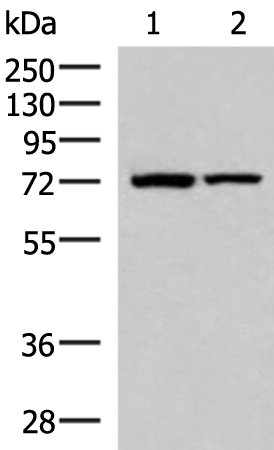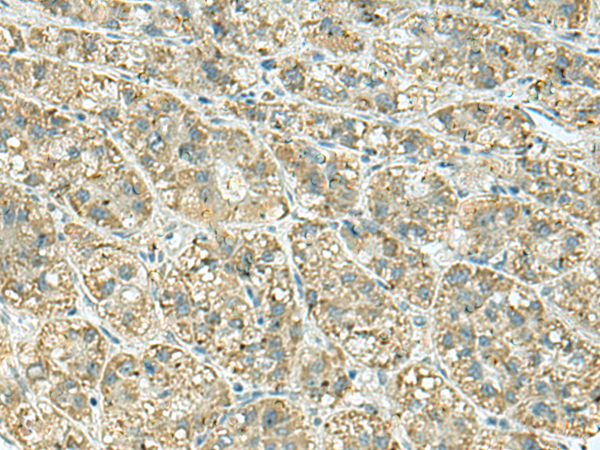

| WB | 咨询技术 | Human,Mouse,Rat |
| IF | 咨询技术 | Human,Mouse,Rat |
| IHC | 1/30-1/150 | Human,Mouse,Rat |
| ICC | 技术咨询 | Human,Mouse,Rat |
| FCM | 咨询技术 | Human,Mouse,Rat |
| Elisa | 1/5000-1/10000 | Human,Mouse,Rat |
| Aliases | JP1; JP-1; CMT2K |
| WB Predicted band size | 72 kDa |
| Host/Isotype | Rabbit IgG |
| Antibody Type | Primary antibody |
| Storage | Store at 4°C short term. Aliquot and store at -20°C long term. Avoid freeze/thaw cycles. |
| Species Reactivity | Human, Mouse |
| Immunogen | Synthetic peptide of human JPH1 |
| Formulation | Purified antibody in PBS with 0.05% sodium azide and 50% glycerol. |
+ +
以下是关于JPH1抗体的3篇代表性文献及其简要摘要:
---
1. **文献名称**:*Junctophilin 1 suppresses tumor progression by regulating endoplasmic reticulum-mitochondria interaction in colorectal cancer*
**作者**:Li X, et al.
**摘要**:该研究通过免疫组化、Western blot等技术,利用JPH1抗体检测其在结直肠癌组织中的表达,发现JPH1通过调控内质网-线粒体相互作用抑制肿瘤进展,低表达与患者不良预后相关。
---
2. **文献名称**:*Altered expression of junctophilin-1 in cardiac hypertrophy and its role in arrhythmogenesis*
**作者**:Chen Y, et al.
**摘要**:研究通过JPH1抗体分析心肌肥大模型中蛋白表达变化,发现JPH1下调导致心肌细胞钙信号紊乱,从而诱发心律失常,提示其作为心脏疾病潜在治疗靶点。
---
3. **文献名称**:*JPH1 gene mutations and protein expression defects in human male infertility*
**作者**:Wang H, et al.
**摘要**:该研究在男性不育患者中发现JPH1基因突变,通过免疫荧光技术结合JPH1抗体证实突变导致精子细胞中蛋白定位异常,影响钙稳态和精子功能。
---
**备注**:JPH1抗体相关研究相对较少,部分文献可能侧重其基因功能而非抗体应用。建议通过PubMed或Google Scholar以“JPH1/junctophilin-1 antibody”为关键词筛选最新研究。
The JPH1 antibody targets junctophilin-1 (JPH1), a member of the junctophilin family critical for maintaining structural and functional coupling between plasma membrane voltage-gated Ca²⁺ channels and intracellular ryanodine receptors in excitable cells. Predominantly expressed in neurons and pancreatic β-cells, JPH1 facilitates precise regulation of Ca²⁺ signaling, which is essential for neurotransmitter release, insulin secretion, and cellular excitability. Its role in stabilizing endoplasmic reticulum-plasma membrane junctions has drawn attention in neurobiology and metabolic research.
JPH1 antibodies are widely used to investigate molecular mechanisms underlying neurological disorders, diabetes, and cardiovascular diseases. Studies link JPH1 dysfunction to disrupted Ca²⁺ homeostasis, potentially contributing to pathologies like Alzheimer’s disease, arrhythmias, and impaired glucose metabolism. These antibodies enable detection of JPH1 expression levels, cellular localization, and interaction partners via techniques such as Western blotting, immunohistochemistry, and co-immunoprecipitation. Recent research also explores JPH1’s involvement in cancer progression, where altered Ca²⁺ dynamics may influence tumor cell proliferation and apoptosis. Despite its significance, JPH1’s isoform-specific functions and regulatory pathways remain incompletely understood, necessitating further studies using validated antibodies to unravel its therapeutic potential. Commercial JPH1 antibodies are typically raised against conserved epitopes, with validation emphasizing specificity across human and model organism samples.
×